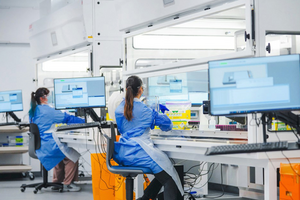UKHSA 10-year science strategy launches to secure health and prosperity
UKHSA has launched a 10-year science strategy, setting out how UKHSA’s science can save more lives and contribute to the UK’s ambition to be a global science superpower.

The strategy sets out how the UK Health Security Agency’s (UKHSA) scientific capabilities – including genomics, vaccine evaluation, surveillance, data science, diagnostics and toxicology – will be deployed to prepare for future health security hazards, respond to current threats to save lives, reduce harm, protect livelihoods and essentially build the UK’s health security capacity.
Through investment in scientific workforce and deeper partnerships with industry and academia, the strategy sets out UKHSA’s ambitions to:
- predict and anticipate health threats, through unique and expert skills in genomics, data science and surveillance, including disease vector (such as mosquitoes and ticks) surveillance
- create a more secure environment, by enhancing our understanding of the threats in the environment and building scientific defences against these hazards
- reduce and eliminate health threats, by strengthening the scientific evidence underpinning health protection programmes – at home and abroad
- act on the scientific evidence, translating data, knowledge and insights into practical actions
- unlock the potential of scientific assets, and secure the legacy from the pandemic to increase the impact of our science on health and economic prosperity, strengthening vaccine and diagnostic development and evaluation and data science
Professor Isabel Oliver, Chief Scientific Advisor at UKHSA, said:
We saw the art of the possible during the coronavirus (COVID-19) pandemic with genomic data allowing the rapid identification and characterisation of variants enabling the rapid development and evaluation of diagnostics, vaccines and therapeutics.
Science was the backbone of the world’s response, helping us to understand the virus, how to best protect ourselves and ultimately live safely with the virus. UKHSA will deploy its unique scientific capabilities working with partners to protect lives and livelihoods from the health threats we are facing now and those we will detect, prevent and control in future.
Professor Dame Jenny Harries, Chief Executive of UKHSA, said:
UKHSA protects our communities from infectious diseases and the impact of chemical, radiological and other environmental health hazards. Our diverse scientific capabilities and partnerships are the foundation of our work, underpinning everything we do.
We are already working to continuously protect the public from existing and emerging health threats, but our new strategy will ensure the UK is ready to tackle all current and future health threats quickly and effectively, securing the best health outcomes and greater prosperity for the country.
Health Minister Maria Caulfield said:
Cutting-edge science showed its power throughout our response to the COVID-19 pandemic and will continue to protect people from potential future health threats.
UKHSA’s new science strategy will ensure the UK remains one of the world’s science superpowers, while protecting people from illness and reducing pressure on NHS services – helping to deliver on the government’s priority of cutting waiting lists.
Minister of State at the new Department for Science, Innovation and Technology George Freeman MP said:
The COVID-19 pandemic was a wake-up call for the importance of health economic resilience and security with big lessons for enhanced pathogen detection, biosecurity, pandemic preparedness and better understanding of the real drivers of health economic resilience. As well as learning why some populations, from cities to entire countries, were remarkably more resilient than others, as revealed by the work of the G20 Reform for Resilience Commission.
UK leadership in pathogen sensing, rapid genomic sequencing, vaccine manufacturing and clinical informatics proved to be vital in saving millions of lives.
The UK’s major investment in life sciences in the last 10 years has paid dividends and helped attract billions of new investment in mRNA drug and vaccine technologies, and clinical trials.
This is why it’s so important for UKHSA to have a clear scientific capabilities plan, which builds on the investments we are already making to support this vital £94 billion life sciences sector, including most recently the £350 million joint government and industry backing for life sciences manufacturing in the last 2 years alone, our commitment to double funding for dementia research to £160 million a year by 2024 to 2025, and £50 million funding for medical research charities.
Health security is economic security: for the UK and the globe.
Through this work, the agency will identify and address threats rapidly, protecting people’s health and livelihoods, reducing the burden on NHS services and ultimately limiting the costs associated with major outbreaks and incidents.
Our developments include a new Centre for Climate and Health Security, including delivering a 5-year assessment report on the Health Effects of Climate Change. In addition, UKHSA is working in partnership to accelerate and expand its role in new diagnostics and developing the organisation’s genomic capabilities to detect threats to health rapidly and effectively, as well as supporting the development of the vaccines and therapeutics that we need to protect health.